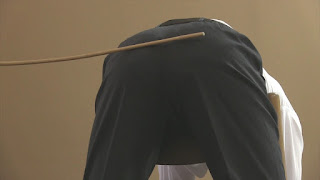Memories: ‘Entertaining’ stories of canings
The canings boys of Cranbrook School, New South Wales, Australia, received did not seem to bother them too much if their accounts when marking the centenary of the school in 2018 are to believed. The cane was finally and permanently outlawed in Australia in 1997.
Below are some extracts from a website
covering the school’s history.
If they were not traumatised by the
experience, many old Cranbrookians at least have some entertaining stories to
tell of the “sharp stings” that “everyone used to get” and the seemingly
innocuous misdemeanours that warranted them. Most old boys agree that only
the Headmaster or Masters were permitted to use the cane and generally gave
“two, four, or six” strokes depending on the severity of the
misdemeanour. Ian Platt Hepworth “received all of those different stages”
during his schooling, at one time for quoting “at least half a page of the
Bible verbatim” in an exam. His teacher thought that he was cheating.
According to Errol Bode, “the punishment
was usually fairly minimal. Well, the requirement for punishment was minimal”
with one unlucky boy receiving “six across the bottom” for smiling in early
morning prayers. Colin Douglas also recalled “getting the cane quite a
number of times”, once for drawing attention to a cufflink that was missing in
a portrait of his teacher Polly Perkins. This missing cufflink quickly became
known as the “missing link”, which Colin reflected was understood at the time
as “the evolution of mankind, and wasn’t very complimentary”.
Nonetheless, some clever boys managed to
mitigate the effects of caning. According to Colin, “if you knew you were going
to get caned you put an exercise book down your pants at the back”, but risked
receiving twice as many stokes if caught.
A few Masters have gone down in student
memory for their fearsome “caning technique” (Headmaster Hone was known as
“Blitz” and another teacher was nicknamed “Flogger Martin”), but the two
Masters who most readily embraced the cane have been largely warmly remembered
as good disciplinarians who enlisted an effective form of punishment. Alan
Sharp reflected that Polly Perkins was a “firm”, “intelligent” and “remarkable
little man” and, according to Barry Chard, Algie Child “was universally liked”.
Marc Podosky believed that the cane
“didn’t do me any harm. As a matter of fact it helped me … pulled me into
gear”. He
was not alone. Several past students viewed this divisive form of punishment as
“very just and satisfactory”, because “that was it – it was all over”.
Picture credit: Sting Pictures.
For more True Memories,
click here
Traditional School Discipline
Traditionalschooldiscipline@gmail.com







Comments
Post a Comment